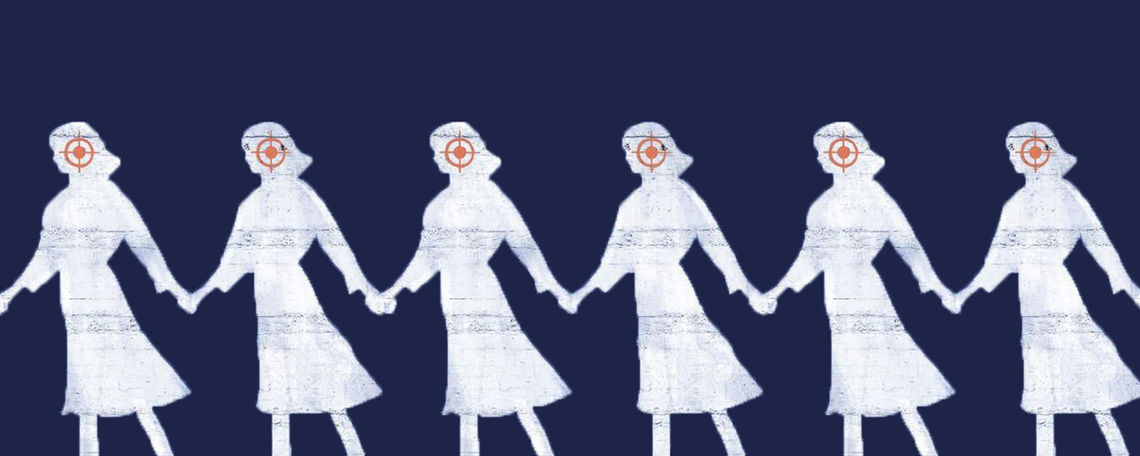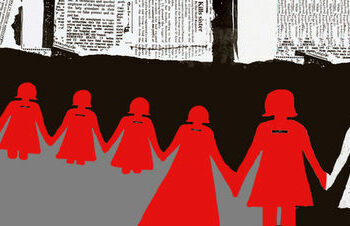

Days ago, news about a 16-year-old girl found strangled to death in Yerevan rapidly spread and became one of the hottest topics of discussion during holiday gatherings.
On Christmas morning, the press service of the police announced they received information on January 5, at 11:10 p.m. that the body of a young woman had been discovered in an apartment on Sayat-Nova Avenue. A team of investigators was sent to the scene where they discovered signs of strangulation on the neck of a 16-year-old girl who was renting the apartment. Soon after, a 26-year-old man was arrested. Police found a tablet belonging to the girl on the man, as well as a knife.
In Armenia, a country that considers children sacred, this news became a wide topic of debate on different social media platforms. First, the girl’s lifestyle and purported behavior was targeted: How does a minor rent an apartment in an expensive neighborhood? What was she doing with a man ten years her senior? Did they have sexual relations? Didn’t she have parents who could control her behavior? Lengthy discussions and the most egregious comments were made about the personal life over the fresh corpse of a child choked to death
This, however, isn’t anything new in Armenian society.
Every time a violent crime takes place, conversations don’t revolve around condemning the violence. Instead, questions are raised about what the person did to be killed. And apparently, it is always the victim who is at fault because, as the famous fable goes, next to the strong, the weak are always to blame. And aren’t we all a little “stronger” on social media?
Psychologist Siranush Davtyan, who works at the Sexual Assault Crisis Center said that this case, similar to other cases of gender-based violence in the country, garnered the typical reaction – the woman is culpable for her own demise.
“Also, stereotypes that specific ‘types’ of people are subjected to violence and it happens in specific types of families were once again pushed forward,” Davtyan explains. “However, when the perpetrator is justified the chain of violence grows bigger.”
Society’s condemnation, however, doesn’t come in the form of mere words that are uttered. They have a serious effect on similar cases in the future. Thus, people who are victims of violence or rape tend to not talk about what happened to them because they want to avoid criticism and the disparaging looks from society.
Cultural anthropologist Aghasi Tadevosyan says that such extreme reactions are typical to more conservative segments of Armenian society, who believe morality is connected to sexuality.
“It’s unfortunate that there is a large part of society that thinks the most important human values are secondary compared to their notions of what a woman’s sexual behavior should be like,” explains Tadevosyan. In traditional Eastern societies, the perception is that men maintain control over a woman’s sexuality, he says, adding, “It is the traces of these attitudes that our society still maintains today. And, in fact, instead of valuing a person’s life, people attach importance to things that are supposedly related to a girl’s sexual behavior.”
In a matter of hours, the young girl’s sex life was discussed to such lengths that her mother felt compelled to comment and stressed that her daughter did not have sexual relations with the killer, thus, trying to at least “clear” her child’s name and protect her from posthumous attacks.
Human rights activist and coordinator of the Coalition to Stop Violence Against Women Zara Hovhannisyan said that it is the way media covers such cases that usually leads to the kind of commentary that was witnessed surrounding the death of this child and this is a serious issue.
“Improper coverage of these cases leads to the violation of people’s privacy,” explained Hovhannisyan. “It allows society to make judgments on this case, for example, posting photos of exposed body parts, bedside scenes, a covered body where it is not clear if the victim is nude or not.”
According to Hovhannisyan, the issue here is not only the girl but also the presumption of innocence of the perpetrator who was immediately considered a criminal and was castigated online without a pre-investigation or fair court proceedings.
“In terms of human rights, the rights of the victim or the rights of the assailant, who has not been proven guilty yet, were not respected,” Hovhannisyan says. “There have been many cases when a confession did not correspond to what was discovered during an investigation and later it was proven that the accused was not the actual criminal. The lack of legal awareness by society creates these shameful situations which, in turn, lead to violations of human rights.”
Hovhannisyan explains that the deceased cannot protect themselves and explain what really happened to them. “Society vilifies them and, what is most unfortunate, people do not condemn the violent act properly and place the blame on the victim, especially in the case of women,” she says.
The mother of the victim, speaking about her daughter, said she had her after 13 years of infertility. She lost her husband when her daughter was six and she had been raising her on her own ever since, doing everything she could to take care of her.
“She was my precious child. And she was born on Christmas Day… and they killed her on that day,” she says.
Society will easily turn the page and forget this story in a few days. However, it will also quickly find new targets to criticize and dispense lessons on morality to feel better about themselves. However, their comments will only repeatedly hurt the mother who has forever lost her child and whose wounds will never heal.
The Irreversible Consequence of Indifference
Journalist Gohar Abrahamyan stumbled upon a scuffle on one of the central streets of Yerevan involving an elderly man and his young grandson. While trying to understand the situation, Abrahamyan also uncovered the irreversible consequence of people’s indifference when they witness abuse.
Read moreDomestic Violence: An Imperfect Law and Enduring Stereotypes
Another case of a woman being killed by her husband has forced Armenian society to speak once again about the one thing it doesn’t like to address - domestic violence.
Read moreThe Istanbul Convention Digested
When a young woman was found strangled to death in Yerevan, some in Armenian society decided to give themselves the right to discuss what she must have done to deserve such a fate.
Read more



